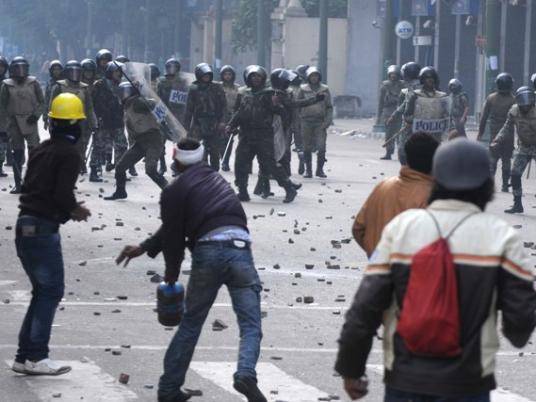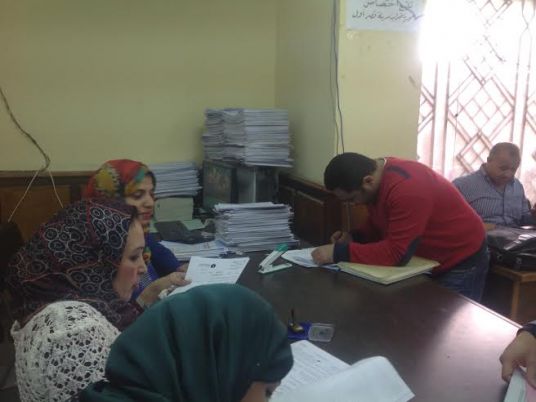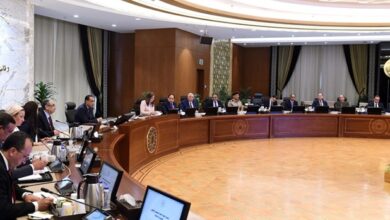
00:30 am: Assistant Health Minister Adel al-Adawy says death toll has reached three, while there are some 255 wounded.
10:40 pm: In a statement, SCAF said that the violence at the cabinet sit-in was caused when protesters assaulted a traffic policeman while he was doing his job, which motivated the guards of the cabinet and the People Assembly buildings to intervene and disperse the sit-in. The statement added that there was no attempt to forcibly end the sit-in.
10:30 pm: Sounds of gunfire can be heard near the cabinet building. Protesters retreated. Some are falling from rubber bullet injuries. Men on motorcycles are rushing to carry the wounded to field hospitals.
10:00 pm: Some protesters threw molotov cocktails into a government building in Qasr al-Aini Street, setting fire into its different floors. Other protesters rushed toward the building with fire extinguishers. Protesters have disagreed over the act of putting fire into a government building; while some thought it was an irresponsible act, others said it was justifiable.
8:30 pm: Reuters reported medical sources as saying that two people died in the clashes.
7:00 pm: Protesters in Qasr al-Aini Street chant, "kill Khaled and kill Mina, each of your bullets make us stronger." They refer to Khaled Saeed, who was tortured to death by policemen last year, spurring a wave of anti-police protests, and Mina Daniel who was killed when military forces dispersed a march of mostly Copts last October.
6:00 pm: "[The Supreme Council of the Armed Forces (SCAF) advisory council] will try to urge the SCAF to issue a statement to explain the [clashes today]," presidential hopeful Mohamed Selim al-Awa tells Al-Masry Al-Youm.
The advisory council will hold a meeting at 7 pm to discuss the crisis, Awa adds.
5:40 pm: MP Amr Hamzawy submitted a complaint at the Qasr al-Nil police station against SCAF, military police and the government. "I thought the government would keep its promise not to use violence against protesters. But as usual, promises are not held. I submitted the complaint as an MP and a citizen."
5:30 pm: Darkness is making it difficult for protesters to spot where rocks being thrown at them are coming from.
5:20 pm: Presidential hopeful Mohamed ElBaradei criticizes the way military police broke up the sit-in outside the cabinet building, describing it as "barbaric," "brutal," and "the greatest violation to all human laws."
He also blasts the authorities' handling of the crisis: "This is not the way countries should be managed."
ElBaradei wonders why the military police intervened to break up the sit-in, if the prime minister is now supposed to have the executive powers of the president of the republic, according to a recent SCAF decree.
"What are the powers of the military police to intervene? Where is credibility and who is in charge?" he asks.
ElBaradei also criticizes the advisory council, saying it is "just a front" for the SCAF.
"Was the advisory council consulted before [the military] used excessive force to break up the sit-in? And if it was not consulted, does this mean it is just a front?" he concludes.
5:15 pm: People are throwing Molotov cocktails down on protesters from the top of the People's Assembly building.
4:30 pm: "The [ongoing] clashes [around the cabinet building and Qasr al-Aini Street] are meant to create chaos, as each time Egypt is close to achieving stability, a new problem is created," says a military source.
An army officer has been injured by a live bullet and transferred to a military hospital as a result of the clashes, the source adds.
"There are desperate attempts aiming to undermine Egypt's stability and drag the country into chaos, especially during the [parliamentary] elections," the source continues. "Some forces began to feel that Egypt was moving on the path to stability through elections, meaning they would lose the legitimacy of their presence in [Tahrir] Square. This prompted them to create standoffs with security forces."
New Prime Minister Kamal al-Ganzouri has refused to comment on the clashes or further explain the developments around the cabinet building.
Ganzouri canceled all his meetings today, including TV interviews, to monitor the situation, holding phone calls with the Supreme Council of the Armed Forces (SCAF) and Interior Ministry officials.
4:00 pm: At least one person injured in the clashes today may have been hit by live ammunition, says Eva Boutros, director of the field hospital set up near the Protestant church on Qasr al-Dubara Street.
Earlier today: Thirty-six people were injured as of 4 pm Friday when military forces and unidentified people attacked a sit-in outside the cabinet building, Assistant Health Minister Adel al-Adawy told Al-Masry Al-Youm.
Clashes continued on Qasr al-Aini Street, with protesters reporting hearing gunshots, and protesters and military forces throwing stones at each other.
At around 4:30 pm, protesters lit a large fire in the middle of Qasr al-Aini, in an attempt to obscure the visions of those throwing stones at protesters from buildings overhead. Fighting was primarily occuring on three fronts, the upper and lower roofs of a nearby building and at the front of Maglis al-Shaab Street. Protesters were throwing rocks at unkonwn assailants who were throwing rocks, ceramics, and fixtures from nearby buildings, including wall hangings with Quranic verses on them, back at them, according to eyewitnesses.
Another eyewitness said that assailants throwing rocks from the tops of nearby buildings were armed had pistols slung around their backs.
Essam Kamel, a medic in a field hospital set up in front of the Mugamma administrative building near Tahrir Square, said that his hospital had received about seven people injured with live bullets in the previous two hours, in addition to receiving dozens of protesters at dawn.
Two members of the recently formed advisory council to the ruling military council, Moataz Bellah Abdel Fattah and Ahmed Khairy, resigned in protest of the military police's use of violent force.
Abdel Fattah said he expects other advisory council members to follow him in resigning, as he is opposed to the "unjustified violence of the miliary police against peaceful protesters."
Lawyer Zeyad al-Alaimy, a parliamentary candidate heading the Egyptian Bloc's list in Cairo's fourth constituency, said he was beaten by military police breaking up the cabinet sit-in early Friday morning.
"Once I heard protesters were being assaulted I headed to the sit-in, where hundreds of military personnel had attacked protesters just before I arrived," he said.
"When I reached the area a group of military soldiers surrounded me and an officer told me: 'Do not think the People's Assembly will protect you,'" Alaimy recalled.
Sheikh Mazhar Shaheen, the popular imam of Omar Makram Mosque who frequently preaches at protests in Tahrir, criticized the military for "assaulting peaceful protesters outside the cabinet building" in his Friday morning sermon.
"We want to achieve the demands of the revolution," Shaheen went on. "We do not feel that there is any kind of change [in reality]," he said, adding that remnants of the former regime of Hosni Mubarak continue to lead.
After Friday prayers, Shaheen and a number of worshipers headed to Qasr al-Aini Street to check on the situation there, and then returned to Tahrir.
Early Friday morning, army and Central Security Forces could be seen spread out on both Qasr al-Aini and Maglis al-Shaab streets, which were covered with broken glass and rocks. A 59-year-old woman was seen being beaten by military officers.
A group of activists were detained by military and security forces and being held inside the People's Assembly building as of noon Friday, activist Mona Seif told Egypt Independent. While in custody inside the building, Seif reported watching police slap an old woman in the face. She said that police were treating protesters like they had a "personal vendetta" against them.
At around 1 pm, protesters began to be released. Most of them were women and looked badly beaten.
According to witnesses, military forces threw stones and furniture at them from the cabinet building and nearby parliament building, as well as sprayed water hoses at them from atop the parliament building. Several cars were set on fire in the surrounding streets.
Mostafa Bahgat, a cameraman for the OnTV satellite channel, told Egypt Independent that he was assaulted on a side street near the cabinet building by two civilians, who beat one of his legs, stole his camera and ran toward army officers.
A protester showed Al-Masry Al-Youm a prison ID card that fell out of the pocket of a man attacking the sit-in along with soldiers. The protester said it was proof that thugs were hired by the military to attack the sit-in.
In response to the early morning attack, protesters blocked off Qasr al-Aini Street with steel barricades and symbolic coffins.
The sit-in protesters said that the clashes started after one of their fellow protesters, Aboudi Ibrahim, was kidnapped at night. Ibrahim was reportedly arrested by police, beaten and electrocuted, before being released. He was transferred to the nearby Qasr al-Aini Hospital.
As the clashes escalated, protesters sang anti-military and anti-police chants, known to be primarily sung by ultras — or hardcore football fans.
Some 200 protesters have continued to sleep outside the cabinet building to oppose the appointment of the cabinet of Prime Minister Kamal al-Ganzouri. The sit-in began on 24 November, when the military council nominated Ganzouri to be prime minister. Ganzouri had served as prime minister under the toppled regime of Hosni Mubarak.
The sit-in followed week-long clashes between security forces and protesters on Mohamed Mahmoud Street, off Tahrir Square, which left at least 45 dead and scores injured.




